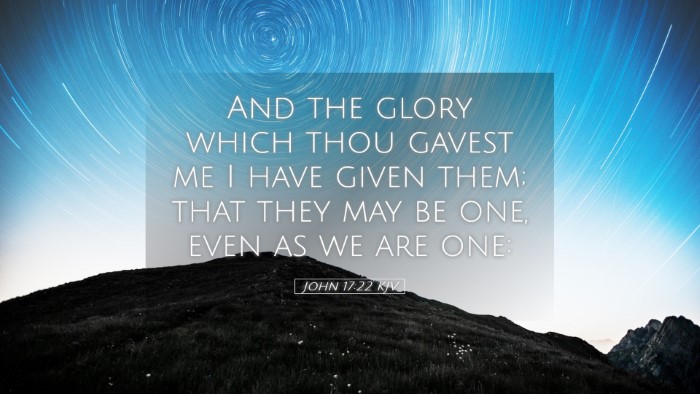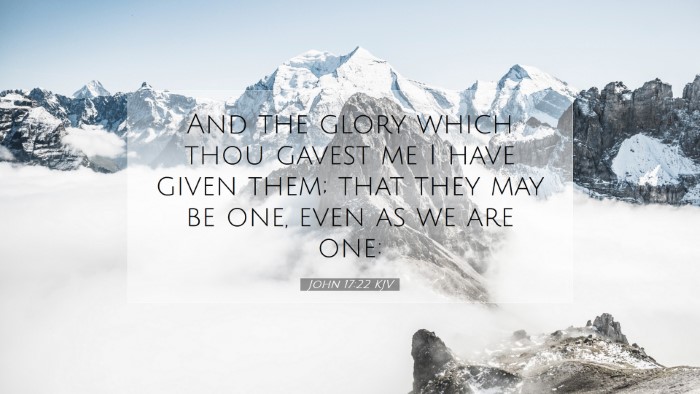Old Testament
Genesis Exodus Leviticus Numbers Deuteronomy Joshua Judges Ruth 1 Samuel 2 Samuel 1 Kings 2 Kings 1 Chronicles 2 Chronicles Ezra Nehemiah Esther Job Psalms Proverbs Ecclesiastes Song of Solomon Isaiah Jeremiah Lamentations Ezekiel Daniel Hosea Joel Amos Obadiah Jonah Micah Nahum Habakkuk Zephaniah Haggai Zechariah MalachiJohn 17:22
John 17:22 KJV
And the glory which thou gavest me I have given them; that they may be one, even as we are one:
John 17:22 Bible Commentary
Commentary on John 17:22
In John 17:22, Jesus prays, "And the glory which You gave Me, I have given them, that they may be one just as We are one." This verse is central to the understanding of the unity among believers and the divine glory bestowed upon them. The insights from various public domain commentators reveal layers of meaning within this profound declaration.
Context of the Prayer
This verse is situated within the larger context of Jesus' High Priestly Prayer, where He intercedes not only for His disciples but also for all believers (John 17:20). The unity that Jesus prays for reflects the essential oneness of the Father and the Son. Each commentator acknowledges that this unity is both a spiritual and practical reality intended for the Church.
The Gift of Divine Glory
Matthew Henry emphasizes that the glory Jesus refers to is not merely for personal enhancement but is bestowed to enable the unity of His followers. He states, "The glory of Christ cannot be separated from His love and grace; it includes the attributes of Christ expressed in believers' lives." This idea invites deep reflection on the implications of this glory in community life.
Albert Barnes contributes that "the glory given to Christ includes His authority, power, and attributes, shared with believers." He notes that Christ has imparted a measure of His glory, providing believers with the capacity to reflect His character, thus enabling the unity of purpose and community. This unity amidst diversity magnifies the transformative aspect of the Gospel.
Adam Clarke offers a unique insight into the concept of glory. He implies that it embodies the “manifestation of God's presence” among believers. This suggests that when believers come together in unity, they reflect the divine presence, making the Church a living testimony to the world. Clarke’s commentary urges believers to recognize their role in representing God’s glory.
Unity as a Testament
The phrase "that they may be one just as We are one" carries profound implications. The unity desired by Christ mirrors the divine relationship within the Trinity. Unpacking this idea, Matthew Henry comments on the necessity of overcoming divisions and fostering harmony within the body of Christ. To achieve this unity, believers must engage in practices of love, forgiveness, and understanding.
Albert Barnes adds depth by noting that this is not a mere desire but also a command. He identifies that the unity of believers is a reflection of their mutual commitment to the teachings of Christ. Hence, as they embody His message, the glory of Christ shines more brightly through them.
Practical Implications for the Church
These commentaries collectively encourage the Church to seek a unified mission. Clarke suggests that when believers genuinely endeavor to maintain unity, they fulfill Christ’s prayer and manifest the Kingdom of God. The call to unity does not ignore legitimate differences; rather, it highlights the imperative of working towards common goals as members of Christ’s body.
Theological Reflections on Glory and Unity
The theological ramifications of this verse are profound. It shapes our understanding of what it means to be a part of the Church universal. The glory shared with believers is an empowering grace, calling them to live in a manner that reflects God’s nature. Matthew Henry asserts that "the glory of Christ is realized in the life of the Church when it exemplifies love and oneness."
Barnes insists that the unity of believers serves as a powerful testament to the truth of the Gospel. The world witnesses this unity, and it compels them to acknowledge the divine origin of Christ’s mission. Therefore, the unity among believers is not just for their benefit but is part of God’s larger salvific plan.
The Church as a Reflection of Divine Glory
As we reflect on John 17:22, we are reminded that the Church has a role to play in the outworking of God’s revelation to the world. Each commentator calls believers to embrace their calling to be reflections of God’s glory, much like the body reflecting the head.
Adam Clarke poignantly remarks that the Church is to be "a living epistle," known and read by all men (2 Corinthians 3:2-3). This means that our unity not only honors God but also serves as a visible sign of His kingdom at work on earth.
Conclusion
In summary, John 17:22 invites us into a deeper understanding of our identity as believers. The profound truth that Christ has given us His glory calls for a commitment to unity that mirrors His divine relationship with the Father. As pastors, students, theologians, and Bible scholars, we are challenged not only to uphold this truth but also to live it out in tangible ways, fostering an environment of love, peace, and mutual edification.
As we explore the depths of this verse, let us strive to realize the implications of Christ’s prayer in our churches and communities, ensuring that our lives reflect the glory of God that has been so graciously provided to us.


